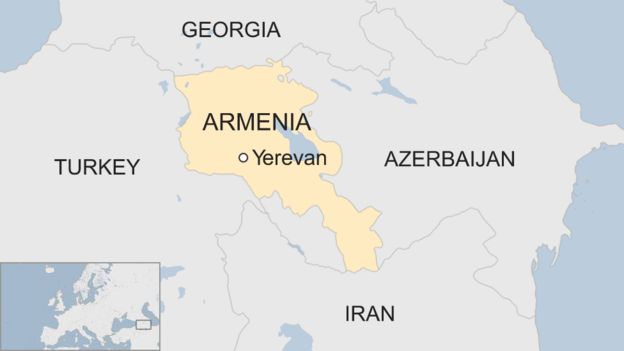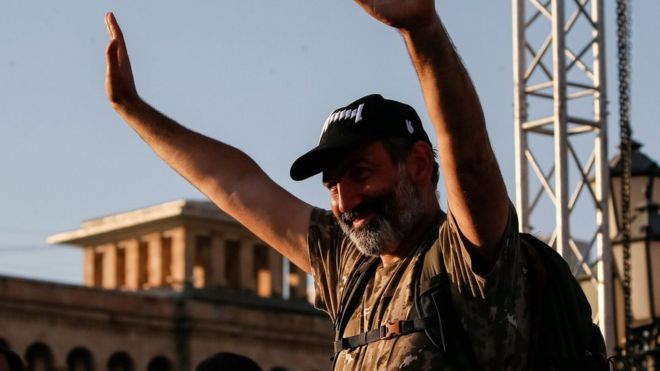Armenian Opposition Leader Suspends Nationwide Protests


Armenian opposition leader Nikol Pashinyan has suspended nationwide protests after the governing Republican Party indicated it would support his bid to be interim prime minister.
The
demonstrations brought much of Armenia to a standstill on Wednesday.
Mr Pashinyan
told supporters that the party's position needed clarifying but protests would
be suspended for a day.
Republicans
blocked Mr Pashinyan's bid to become prime minister in a parliamentary vote on
Tuesday.
In a
statement on Wednesday, the party did not mention Mr Pashinyan by name but said
they would back a candidate nominated by a third of MPs at next week's vote in
parliament. It said it would not put forward its own candidate, leaving Mr
Pashinyan as the only nominee.
"The
issue has practically been solved," Mr Pashinyan told tens of thousands of
supporters gathered in the capital, Yerevan.
"All
factions said they would support my candidacy... We are suspending protests and
going to have a rest."
Mr Pashinyan
has led weeks of anti-government protests that forced Serzh Sargsyan to resign
after 10 years in power.
On Tuesday,
he called for a general strike after Republican Party MPs refused to back him
in the vote for interim prime minister.
Parliament
is due to hold another extraordinary session on 8 May to try to elect an
interim prime minister.
Mr Pashinyan
said he would formally submit his candidacy on Thursday and called on
supporters to hold a huge rally on Tuesday to "seal our victory".
Earlier, he
told the BBC that protesters were fighting for their rights and dignity.
"I want
to be clear, it isn't a fight for Nikol Pashinyan becoming prime minister, it's
a fight for human rights, for democracy, for rule of law and that is why our
people aren't tired and won't be tired," he said.
Protests
broke out across Yerevan and other main cities on Wednesday with cars and
lorries blocking roads, while demonstrators stopped traffic on the route to the
main airport.
Tourists had
to abandon vehicles and carry their luggage. Metro stations in Yerevan were
closed as part of the campaign of disobedience.
Entrances to
several ministry buildings in Yerevan were blockaded and rail services were
disrupted. Trains were not running between Yerevan and the second city, Gyumri,
and checkpoints near the Georgian border were affected.
There was
further disruption in Gyumri itself and in the third city Vanadzor, where a
large crowd of protesters blockaded the mayor's office and other civic
buildings. Three thousand workers from a local sewing factory walked out and
cut off some of Vanadzor's biggest roads, reports said.
During the
day Mr Pashinyan posted a message on social media, urging protesters to halt
disruption at the airport, while other opposition politicians appealed to
people not to impede emergency services. Police tried to move protesters off
the roads but there was no sign of violence.
Mr Sargsyan
left the presidency last month after 10 years in power and was then
elected prime minister by a parliament controlled by his Republican party.
Under a 2015 referendum marred by irregularities, Armenia shifted powers from
the president to parliament.
Mr
Sargsyan's move was seen by critics as a way of clinging to office.
The son of a
sports teacher, Mr Pashinyan came to prominence in 1995 when he began writing
about government corruption. He founded a newspaper three years later and went
on to take the role of editor at a best-selling daily, which criticised the
government of President Robert Kocharyan and then of President Sargsyan.
When Mr
Sargsyan was elected president in 2008, Mr Pashinyan was among the leaders of
protests that turned violent and left 10 people dead. At that point he went
into hiding, surrendering to authorities the following year.
Jailed the
following year on charges of murder and organising mass unrest, he was
eventually released under an amnesty in 2011.
In 2012, he
was first elected to Armenia's parliament. He argues that only he can steer
Armenia to free and fair elections.
His critics
accuse him of bringing chaos to the streets and question his ability to lead as
prime minister.
FROM .bbc.com/news/world-europe

No comments